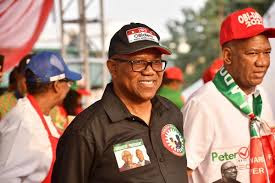 |
| Portrait of Peter Obi |
Introduction
Peter Obi is a prominent Nigerian businessman and politician known for his efforts to promote economic development and good governance in Nigeria. Obi was born on July 19, 1961, in Onitsha, Anambra state, into a family that valued education and hard work. His parents were both successful traders who instilled in him values such as discipline, perseverance, and humility.
Early Life and Education
Obi attended Christ the King College in Onitsha, where he excelled academically and participated in a variety of extracurricular activities. He later attended the University of Nigeria, Nsukka, and graduated with a Bachelor of Arts in Philosophy in 1984.
 |
| Peter Obi University certificate from UNN |
Obi moved to Lagos after finishing his undergraduate studies, where he worked for several years in a variety of industries, including banking, marketing, and sales. He eventually returned to school and graduated from the University of Lagos with a Master of Business Administration (MBA).
A Career in Business
Obi's business career took off when he founded Next International Nigeria Ltd, a leading distributor of general goods in Nigeria, in the late 1990s. Obi became one of Nigeria's wealthiest men as a result of the company's success, and he went on to invest in other industries such as real estate, hospitality, and manufacturing.
 |
| Next International, One of Peter Obi Businesses |
Obi's business success earned him local and international recognition and awards. He was named Nigerian Business Leader of the Year by the Economic Community of West African States (ECOWAS).
Political Career
Obi's political career began in 2003 when he ran for and won the governorship of Anambra state on the platform of the All Progressives Grand Alliance (APGA). His election, however, was marred by controversy, and he was impeached in 2006 by the state House of Assembly.
Obi challenged his impeachment in court and was eventually reinstated in 2007, thanks to a Court of Appeal ruling. He served out his first term and was re-elected in 2010, serving until 2014.
 |
| Peter Obi was the Governor of Anambra State from 2006 to 2014 |
Obi prioritized economic development, education, and infrastructure as governor, enacting policies and programs that encouraged job creation, increased access to quality education, and improved the state's infrastructure. He also worked to reduce waste and corruption in government, earning him praise for his efforts to promote good governance.
His two terms as Anambra state governor lasted from March to November 2006, February to May 2007, and June 2007 to March 2014.
Obi's leadership style was distinguished by frugality and simplicity, and he was well-known for his willingness to collaborate with people of opposing political ideologies to achieve common goals.
After leaving office as governor, Obi remained active in politics, running as the People's Democratic Party's (PDP) Vice Presidential candidate in the 2019 presidential elections, finishing second to incumbent President Muhammadu Buhari.
 |
| Atiku Abubacar and Peter Obi poster for 2019 Presidential Election |
On March 24, 2022, Peter Obi declared his intention to run for President of Nigeria on the Peoples Democratic Party platform but later withdrew and announced he would run on the Labour Party platform instead. On May 24, Peter Obi resigned his membership in the Peoples Democratic Party in a letter to the party's leadership. Obi reportedly complained about massive delegate bribery and vote buying during the party's presidential primary, citing the existence of a party clique working against him. Obi unveiled his running mate, Senator Yusuf Datti Baba-Ahmed, on July 8, 2022.
 |
| Peter Obi and Senator Yusuf Datti Baba-Ahmed |
Younger generations under 30 proved to be some of Obi's most ardent supporters, demonstrating their support through social media, protests, and street marches. With his core message of prudence and accountability, Obi was able to turn his previously unknown Labour Party into a strong third force against two political heavyweights, the PDP (Peoples Democratic Party) and the APC (All Progressives Congress) (All Peoples Congress).
 |
| The 3 Main Presidential Aspirant; Obi, Atiku and Tinubu |
The results were revealed on March 1, 2023. With 8.79 million votes, Bola Tinubu of the All Progressives Congress party was elected president. Obi won both Lagos and Abuja with 6.1 million votes. Obi finished third, trailing winner Bola Tinubu and Peoples Democratic Party nominee Atiku Abubakar. Due to numerous allegations, reports, and evidence of voter manipulation, disenfranchisement, and rigging in the elections, Obi announced at his press conference that he would challenge the election results.
Impact and Legacy
Obi's contribution to Nigerian society cannot be overstated, as his accomplishments and contributions have been recognized both locally and internationally. He has demonstrated that leadership can be both effective and ethical as a successful businessman and politician, inspiring many Nigerians to pursue excellence and integrity in their own careers.
Obi's efforts to promote economic development, good governance, and education have had a significant impact in Anambra state and beyond, benefiting countless Nigerians.
Peter Obi's life and career are testaments to the power of determination, hard work, and vision. His accomplishments as a businessman and politician have had a profound impact on Nigerian society, inspiring many to strive for excellence and integrity in their endeavors.

Comments
Post a Comment